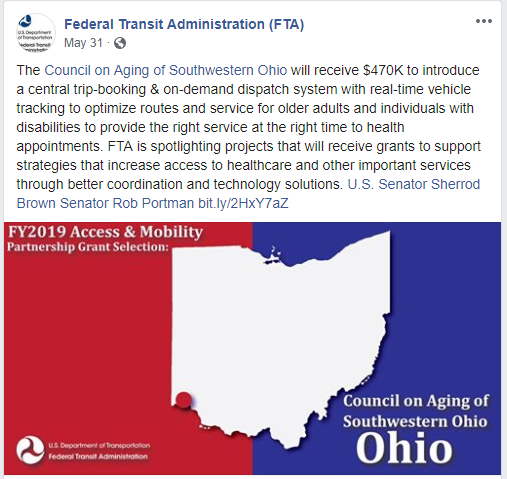News
COA awarded federal grant to improve seniors’ access to transportation
July 15, 2019
 Council on Aging (COA) is the recipient of a of $470,000 grant from the Federal Transit Administration (FTA). The award is part of FTA’s Access and Mobility Partnership Grants which awarded approximately $9.6 million to 37 projects led by transit agencies, governmental authorities and nonprofit organizations to support innovative transportation solutions to expand access to health care. The awards were announced May 22.
Council on Aging’s funding will be used to design and implement a centralized, on-demand transportation service to coordinate non-emergency medical transportation for older adults in COA’s service area, beginning with a pilot in the Hamilton County Elderly Services Program.
Council on Aging has long sought a way to improve transportation services for older adults and people with disabilities in the region. Census data and research show a growing population of older and disabled adults in the Greater Cincinnati region and a lack of confidence in the region’s transportation infrastructure to meet the growing need.
Council on Aging (COA) is the recipient of a of $470,000 grant from the Federal Transit Administration (FTA). The award is part of FTA’s Access and Mobility Partnership Grants which awarded approximately $9.6 million to 37 projects led by transit agencies, governmental authorities and nonprofit organizations to support innovative transportation solutions to expand access to health care. The awards were announced May 22.
Council on Aging’s funding will be used to design and implement a centralized, on-demand transportation service to coordinate non-emergency medical transportation for older adults in COA’s service area, beginning with a pilot in the Hamilton County Elderly Services Program.
Council on Aging has long sought a way to improve transportation services for older adults and people with disabilities in the region. Census data and research show a growing population of older and disabled adults in the Greater Cincinnati region and a lack of confidence in the region’s transportation infrastructure to meet the growing need.
- In 2015, the Cincinnati region was include in the annual United States of Aging survey, where local data found: “Older adults in Cincinnati express low confidence in their community’s preparedness, specifically with transportation and long-term care as they age.”
- Transportation was identified as a top concern among respondents in COA’s 2018 Community Needs Assessment.
- There are more than 804,000 people age 60 or older in Hamilton County and nearly 36,000 county residents age 65 or older have at least one disability.
- As an administrator of publicly-funded home and community-based care programs, COA is a significant transportation resource for seniors and people with disabilities in southwestern Ohio. In 2018, Council on Aging provided approximately 47,000 one way trips for non-emergency medical transportation to eligible older adults via Hamilton County’s Elderly Services Program, which is funded by a property tax levy.
- There are multiple transportation providers, but they operate independently, each using a different mechanism to optimize routes, focusing only on the customers they are assigned to assist and most often requiring advanced notice.
- Many trips are one-way, with returns where there are no passengers on board.
- Clients may wait for hours for a ride until their assigned provider is available.
- Clients with complex medical needs don’t always have the ability to schedule appointments in advance, as required by most providers in the system. This can result in missed medical appointments, avoidable emergency room and hospital admissions and increased medical costs.
